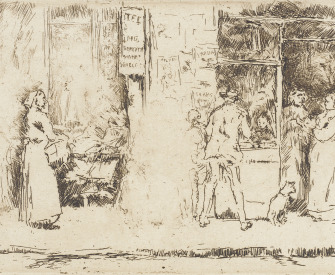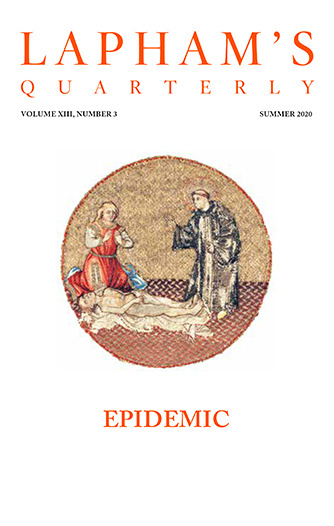The unseen environment is reported to us chiefly by words. These words are transmitted by wire or radio from the reporters to the editors who fit them into print. Telegraphy is expensive, and the facilities are often limited. Press-service news is, therefore, usually coded. Thus a dispatch which reads,
Washington DC, June 1—The United States regards the question of German shipping seized in this country at the outbreak of hostilities as a closed incident
may pass over the wires in the following form:
Washn 1. The Uni Stas rgds tq of Ger spg seized in ts cou at t outbk o hox as a clod incident.
A news item saying:
Berlin, June 1, Chancellor Wirth told the Reichstag today in outlining the government’s program that “restoration and reconciliation would be the keynote of the new government’s policy.” He added that the cabinet was determined disarmament should be carried out loyally and that disarmament would not be the occasion of the imposition of further penalties by the Allies.
may be cabled in this form:
Berlin 1. Chancellor Wirth told t Reichstag tdy in outlining the gvts pgn tt qn restoration & reconciliation wd b the keynote f new gvts policy. qj He added ttt cabinet ws dtmd disarmament sd b carried out loyally & tt disarmament wd n b. the ocan f imposition of further penalties bi t alis.
In this second item, the substance has been culled from a long speech in a foreign tongue, translated, coded, and then decoded. The operators who receive the messages transcribe them as they go along, and I am told that a good operator can write fifteen thousand or even more words per eight-hour day, with a half an hour out for lunch and two ten-minute periods for rest.
A few words must often stand for a whole succession of acts, thoughts, feelings, and consequences. We read:
Washington, Dec. 23—A statement charging Japanese military authorities with deeds more “frightful and barbarous” than anything ever alleged to have occurred in Belgium during the war was issued here today by the Korean Commission, based, the Commission said, on authentic reports received by it from Manchuria.
Here eyewitnesses, their accuracy unknown, report to the makers of “authentic reports”; they in turn transmit these to a commission five thousand miles away. It prepares a statement, probably much too long for publication, from which a correspondent culls an item of print three and a half inches long. The meaning has to be telescoped in such a way as to permit the reader to judge how much weight to give to the news.
It is doubtful whether a supreme master of style could pack all the elements of truth that complete justice would demand into a hundred-word account of what had happened in Korea during the course of several months. For language is by no means a perfect vehicle of meanings. Words, like currency, are turned over and over again to evoke one set of images today, another tomorrow. There is no certainty whatever that the same word will call out exactly the same idea in the reader’s mind as it did in the reporter’s. Theoretically, if each fact and each relation had a name that was unique, and if everyone had agreed on the names, it would be possible to communicate without misunderstanding. In the exact sciences there is an approach to this ideal, and that is part of the reason why, of all forms of worldwide cooperation, scientific inquiry is the most effective.
Men command fewer words than they have ideas to express, and language, as the German writer Jean Paul said, is a dictionary of faded metaphors. The journalist addressing half a million readers of whom he has only a dim picture, the speaker whose words are flashed to remote villages and overseas, cannot hope that a few phrases will carry the whole burden of their meaning. “The words of Lloyd George, badly understood and badly transmitted,” said French prime minister Aristide Briand to the Chamber of Deputies, “seemed to give the Pan-Germanists the idea that the time had come to start something.” A British prime minister, speaking in English to the whole attentive world, speaks his own meaning in his own words to all kinds of people who will see their meaning in those words. No matter how rich or subtle—or rather the more rich and the more subtle that which he has to say, the more his meaning will suffer as it is sluiced into standard speech and then distributed again among alien minds.
Millions of those who are watching him can read hardly at all. Millions more can read the words but cannot understand them. Of those who can both read and understand, a good three-quarters we may assume have some part of half an hour a day to spare for the subject. To them the words so acquired are the cue for a whole train of ideas on which ultimately a vote of untold consequences may be based. Necessarily the ideas which we allow the words we read to evoke form the biggest part of the original data of our opinions. The world is vast, the situations that concern us are intricate, the messages are few, the biggest part of opinion must be constructed in the imagination.
From Public Opinion. Entering Harvard University in 1906, the same year as John Reed and T. S. Eliot, Lippmann assisted George Santayana and for a time had weekly talks over tea with William James. He helped found The New Republic in 1914, worked on Woodrow Wilson’s Fourteen Points, and went to Versailles in 1919 to take part in the treaty negotiations. Lippmann’s column “Today and Tomorrow,” begun in 1931, was eventually syndicated in some 250 U.S. newspapers. He died at the age of ninety-five in 1974.
Back to Issue



